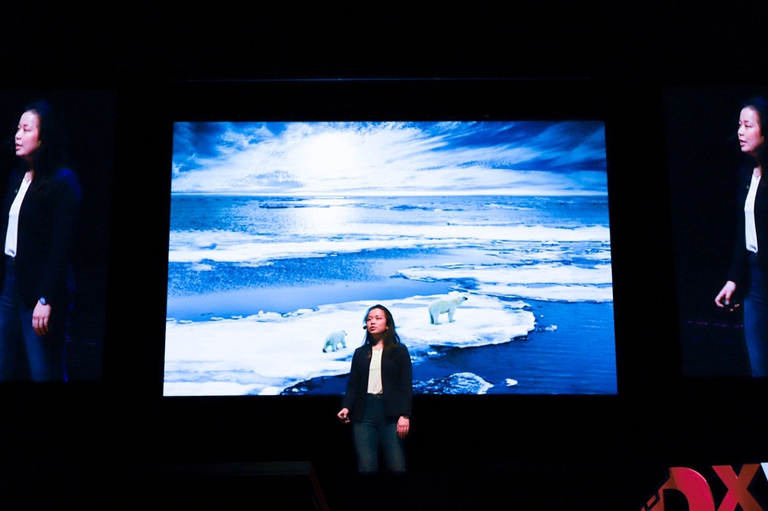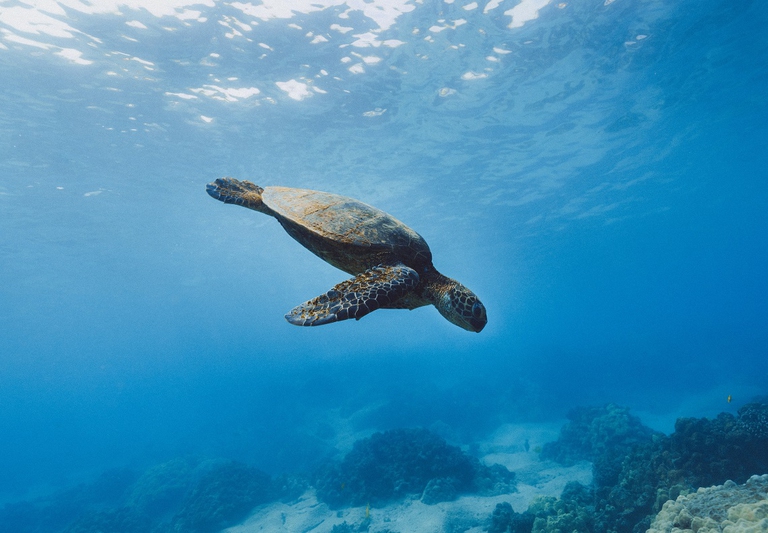
A group of experts in Tokyo suggested pouring radioactive water from Fukushima into the open sea. A marine biochemist explains the consequences of this absurd decision.
Malaysian activist Gabby Tan’s mission is to raise awareness about the risks faced by our oceans, and the need to protect them. She spoke to us about her passions and what inspires her.
While we’ve been inflicting deep wounds on our planet’s ecosystems for hundreds of years, seas and oceans have experienced unparalleled destruction especially in the past thirty years. All are in grave danger, suffocated by a growing amount of plastic, plundered by unsustainable fishing and evermore acidic because of the toxic gases our species is pouring into the atmosphere. And yet we still seem to be indifferent to the plight of marine creatures, and we feel disconnected from the destruction of the underwater world. Not everyone, however, is ignoring this silent tragedy: some have decided to devote their existence to the protection of these mysterious, primordial ecosystems, where life originated billions of years ago. Among them is 18-year-old Gabby Tan from Malaysia, who has always been passionate about geography and the ocean.
Gabby Tan, a member of the Youth Council for World Oceans Day, held every year on the 8th of June, has very clear ideas about her future: she wants to devote her life to protecting the oceans. To do this, the young activist raises awareness by talking in schools about the importance of these ecosystems and the threats they face. Like Greta Thunberg, who started the largest global climate movement in history, the Malaysian activist, thanks to her enthusiasm and determination, aims to inspire young people worldwide, motivating them to take care of the planet that previous generations have left destitute.
“Today we can’t let adults be the only ones with the power to decide on our future. The ecological disaster is urgent, it’s happening now, advancing inexorably and sparing no one. The efforts made up to this point haven’t been enough. We can no longer wait. From now on, we’ll have to accept the challenge and do our part. Fighting this emergency has to become a priority for each and every one of us. Let’s save the oceans and the planet!”. The Malaysian student is conscious that while political and structural interventions are essential, change has to begin from a grassroots level, from everyone altering their everyday behaviours.
Gabby Tan was in Italy for the fifth edition of TEDxVicenza, which took place on the 8th of June and was dedicated to making sense of the great changes of our time. From the stage, the teenager launched an appeal against the consumption of single-use plastics, which have already contaminated the marine food chain and threaten the survival of over 800 animal species. This is what Gabby told us on this occasion.
What pushed you to begin your fight in defence of the oceans?
Growing up just a short trip away from amazing beaches, some of my earliest memories are of playing in the sand and gathering seashells with my grandparents. My love for the ocean only grew from there. A few years down the line and my ocean advocacy journey began during a school trip to a Coral Reef Nursery where I was amazed by the resilience and biodiversity of our reefs, yet terrified after seeing firsthand the impact of plastic pollution and coral destruction.
It was the first time that the urgency to protect our oceans dawned on me. Ever since then I’ve been working to raise awareness and advocate for a healthy ocean in every way possible – whether through speaking at events, writing, campaigning or curating. After all, we depend on our oceans to sustain us, whether or not we live by the water, and it’s our responsibility to make sure they’re as healthy as they once were.
What do you think are the most urgent actions we need to be taking?
We need actions at every level, from individual lifestyle changes to policy changes that will ensure our whole society prioritises, rather than exploits, our oceans. Everyone needs to play their part. As empowered consumers, we can choose to source our seafood from sustainable fisheries, refuse unnecessary single-use plastic, make sure our plastic waste is being recycled and disposed of responsibly, and also minimise our carbon footprint as climate change is directly related to the health of our oceans.
Then we need to make sure changes occur throughout the supply chain and right at the top as well. Join a strike, vote wisely, tell businesses where they must improve and write to or make sure your government knows that we must protect our ocean. In this moment, changing our ways is absolutely necessary and inevitable if we want a good shot at saving our planet and lives, so we have to get used to the idea of changing our comfortable lifestyles.
Greta Thunberg has been a sort of catalyst connecting young people from all over the world who are concerned about environmental issues. Do you think new generations are truly aware of what’s going on?
With facts, videos, news, images and even memes about environmental issues everywhere on social media and the news, my generation can’t help but be aware of and upset about the problems that continue plaguing our world. So when Greta Thunberg’s Fridays for Future strikes and speeches came to light, the School Strike 4 Climate grew extremely quickly, with over 1.5 million youth school-striking worldwide on Friday the 15th of March.
Greta inspired us with her bravery and catalysed the popularity of the climate action movement by showing us clearly that we could send a strong message to our governments.
Siamo anche su WhatsApp. Segui il canale ufficiale LifeGate per restare aggiornata, aggiornato sulle ultime notizie e sulle nostre attività.
![]()
Quest'opera è distribuita con Licenza Creative Commons Attribuzione - Non commerciale - Non opere derivate 4.0 Internazionale.
A group of experts in Tokyo suggested pouring radioactive water from Fukushima into the open sea. A marine biochemist explains the consequences of this absurd decision.
The decline in grey and humpback whales in the Pacific and Atlantic Oceans has been traced to food shortages caused by rising ocean temperatures.
The United Nations has launched a major international alliance for ocean science, undertaking a mission close to all our hearts.
The cargo ship that ran aground off the coast of Mauritius on 25 July, causing incalculable damage, has split in two and its captain has been arrested.
The largest coral reef in the world is severely threatened by climate change, but researchers are developing strategies that could contribute to saving the Great Barrier Reef.
Seychelles have extended its marine protected area, which now covers over 400,000 square kilometres, an area larger than Germany.
Norwegian oil giant Equinor had pulled out of drilling for oil in the Great Australian Bight, one of the country’s most uncontaminated areas. A victory for activists and surfers who are now campaigning for the area to be protected forever.
30 per cent of the planet needs to be protected to stop precipitous species decline. The UN has set out its aims for the the COP15 on biodiversity scheduled for Kunming, China in October.
Ocean warming has risen to record highs over the last five years: just in 2019 the heat released into the world’s oceans was equivalent to that of 5-6 atomic bombs per second. The culprit, no doubt, is climate change.









